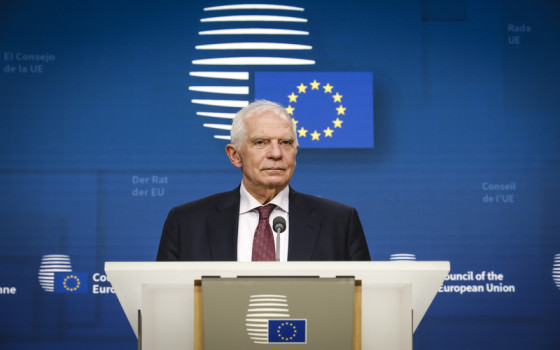
Borrell: All EU countries are obligated to implement the decisions of the International Criminal Court.. He revealed the reasons for not punishing Israel by freezing the partnership agreement

- Europe and Arabs
- Friday , 22 November 2024 10:50 AM GMT
Brussels: Europe and the Arabs
The European Union institutions in Brussels published a statement that included what Josep Borrell, the European Union's foreign and security policy coordinator, said in response to journalists' questions about the position on the International Criminal Court's decision to issue arrest warrants for the Israeli Prime Minister and Defense Minister, where he said, "The tragedy in Gaza must stop. Now, I will be very sober in my comment. It is not a political decision. It is a court decision, a court of justice, an international criminal court. Court decisions must be respected and implemented. Therefore, I note the decision of the International Criminal Court to issue arrest warrants for Prime Minister Benjamin Netanyahu, former Defense Minister Mr. Yoav Galant, and Hamas leaders. This decision is a binding decision and all states, all states party to the Rome Statute of the court, which includes all members of the European Union, are obligated to implement this court decision.
In response to journalists' questions at a press conference in Jordan during his current foreign tour, Borrell revealed that there is opposition to punishing Israel by freezing the association agreement with it and said, "Yes, two member states. As you know, two EU Member States have asked the Commission and me as High Representative to examine whether the behaviour of the Israeli government in fighting against Hamas and causing such a large number of casualties is consistent with Israel's obligations [arising from] the Association Agreement. Because the Association Agreement is not only an economic instrument; “It creates obligations from the point of view of international law and respect for international law by both parties. That is why these Member States and the Commission asked me to study this. That is why we presented a complete record of everything that happened, witnesses and testimonies from international organizations, starting with the UN organizations, and an analysis of what happened, since the terrorist attacks by Hamas against the Israeli kibbutz, in Gaza and in the West Bank – and most recently, in Lebanon. I presented this report, and I considered that according to these facts, Israel was not fulfilling the obligations under the Association Agreement. That was my assessment. The Council did not agree with this assessment.
Regarding the war in Gaza, the European Union was not united. From the beginning there were different approaches. Some Member States were calling for a ceasefire, others were not. When the time came to vote in the [UN] General Assembly, some Member States voted for a ceasefire, others abstained, and others voted against. This clearly shows that there are different approaches. When there are different approaches, I cannot represent them all together. The positions of the EU Member States are so different that It is impossible for any of them to represent such different positions. My role is to seek as much unity as possible – as much as possible. Not to deepen the divisions, but to try to overcome the divisions in order to find common ground. And there is at least common ground, where all the EU Member States come together: supporting the Palestinian state as the only viable solution to the situation in the Middle East, and demanding respect for international law and humanitarian law in the midst of war. That is the common minimum. Hence, there are different perceptions among the Member States that voted for my proposal – while others did not accept it. There are different positions, and I am not saying something that can be considered a secret. It is real, like life. These differences can be explained by historical and cultural reasons related to what happened in World War II and other circumstances. I will not go into the “why” behind some of the different positions among the Member States – but I think I can represent all the EU Member States by saying these two things. International law must be respected, civilians must be protected, and humanitarian law must be respected. I do not think that is happening. Personally, I do not think that is happening. There are gross violations of humanitarian law in the way this war is being conducted. The second thing is that we support a political solution to the conflict. The only political solution to the conflict in order to build peace is to give the Palestinians a state, dignity, and freedom. As difficult as it may be, I don’t see any solution. If someone is opposed to this solution – and Mr. [Benjamin] Netanyahu seems to be opposed to it – then he has to make clear what solution it is. Okay, you don’t want a two-state solution, so what do you want? What solution do you want? Please tell us. The answer is not an answer, it’s an action. They don’t say, they do – and what do they do? Obviously, they push the Palestinians out. But that’s not a solution, because millions of people are not going to disappear into thin air. They’re not going to disappear and they’re not going to migrate to the moon. They’re going to stay. So, you don’t want a two-state solution? Tell everyone what solution you want, because if the solution is to exterminate the Palestinians, it’s not going to happen. The entire international community will not accept this solution.












هل تمتلك الجنائية الدولية قوة للقبض عليهم ام توكل الأمر لجهة ما
هل تمتلك الجنائية الدولية قوة للقبض عليهم ام توكل الأمر لجهة ما